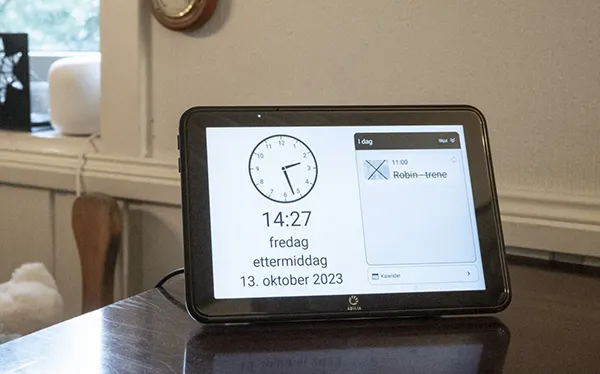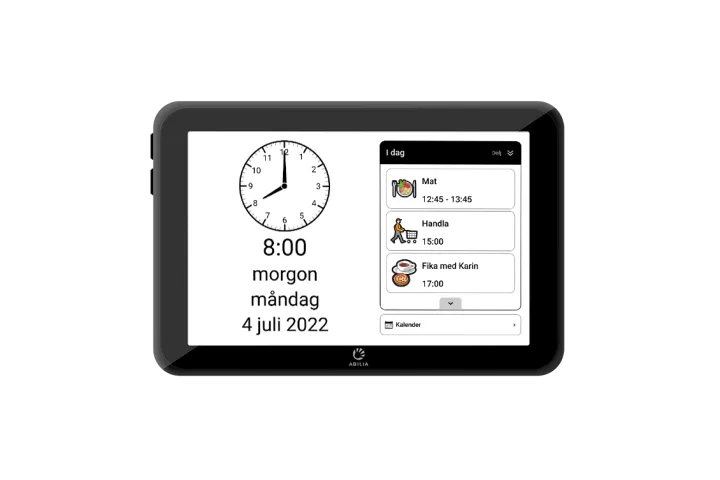Dementia means that daily activities and routines can get forgotten or delayed. This leads to frustration and stress, both for the person with dementia but also for relatives. The CARY Base is a simple calendar that gives structure to daily life and brings lower stress and greater independence.
Robin and Tone
On a rainy autumn day, we have been invited to visit a cosy home in southern Norway. Coffee is on the stove, the room is full of plants, and warm smiles are there to greet us at Tone and Robin's home.
They met each other at the restaurant Lorry in Oslo twelve years ago. And they've been together ever since. They moved to southern Norway nine years ago due to Tone's job.
They both love running – he goes on long, fixed routes outdoors, while she works out on the treadmill at the local gym.
Robin is an open and sociable man aged 72, who pays proper attention to everyone around him. He talks to both friends and strangers and is happy to take a break from his run to stop for a chat with those he meets on the way.

Alzheimer's
Anxiety became a bigger part of their lives one and a half years' ago when Robin developed Alzheimer's. Many routine activities were forgotten, the sequence of things got mixed up and Tone had too much to keep track of.
It was important for them to gain control of daily life and let Robin continue running, as he had done for his entire life.
The CARY Base calendar tool
As Tone realised that an increasing number of tasks were being overlooked, and that they were both entirely dependent on her for following up on daily routines, a calendar tool was the clear solution.
Introducing a piece of Technology Enabled Care (TEC) into a home can be challenging for many people, regardless of how interested you are in technology. But Tone and Robin embraced it. They chose CARY Base, a simple digital calendar solution. It shows the date, time and the day's activities. An alarm can also be set for each activity. So if Robin is home alone, he will still receive a message to get ready for his run.

"CARY Base has made our lives so much easier," says Tone. "It's hard to believe that something so simple can make such a huge difference."
For Tone and Robin, the aid has relieved them of a huge amount of stress. Tone doesn't need to nag, and Robin can be more independent. CARY Base keeps track of the daily routines, while anything out of the ordinary can be written down on a table in the hallway. CARY Base thus helps to keep up the routines and ensure a more streamlined everyday life.
Routines create calm
"We add up to three activities a day, which we find to be a good number for us." Tone has given it some thought and figured out what works for the two of them.
Tone adds the activities directly into the calendar, although it can also be controlled from the myAbilia online solution. It can be linked to multiple caregivers, who can then add activities for the main user. Family members, professionals or other relevant caregivers, for example, can be given access. This means that it can be remote controlled and, when changes to plans happen, it can easily be edited.
Tone recommends not having too many activities in the calendar as it can be confusing for the person with dementia, however, this needs to be assessed on an individual basis.
Robin makes his own breakfast – oatmeal, which he's eaten since he learnt how to make it as a ten-year-old boy. Then there are a few hours of calm at home before he gets ready for his run. The high point of the day.
Before getting the TEC, he still went for a run, but there was never any routine to it. It often didn't fit in with meals or other plans. "It created a lot of stress for us and ruined the plans for the rest of the day."
Robin is a member of the local dementia choir, which has proven to be a very positive experience. When the choir practices became a regular activity, they were also entered into the calendar, as they call their CARY Base.
Avoid stress – by creating calm and autonomy in everyday life
When the calendar was introduced at their home just over half a year ago, Tone took advantage of it immediately. "It's easy to use – simpler than buying a ticket for the tram in Oslo," she jokes, referring to the app people need to use to purchase a tram or bus ticket in Oslo. "CARY Base is user-friendly and works in large type, while you can add your own images if you want."
The next step in using CARY Base is to add more activities for those days when Tone isn't at home. Feeding the cat and remembering to take medicines are Tone's responsibilities, but they're delegated to Robin when she's away.
Tone and Robin are conscious that Robin has a diagnosis that won't simply go away. This means they need to live in the present and enjoy themselves. They're going to spend the good times travelling – first to Copenhagen on a Christmas cruise, so they can enjoy the cultural experiences in the area.
"What's important for us is to avoid stress. We need to show patience and humility towards both each other and the disease. We're not thinking of the future right now – rather we're trying to enjoy the present to the full."



